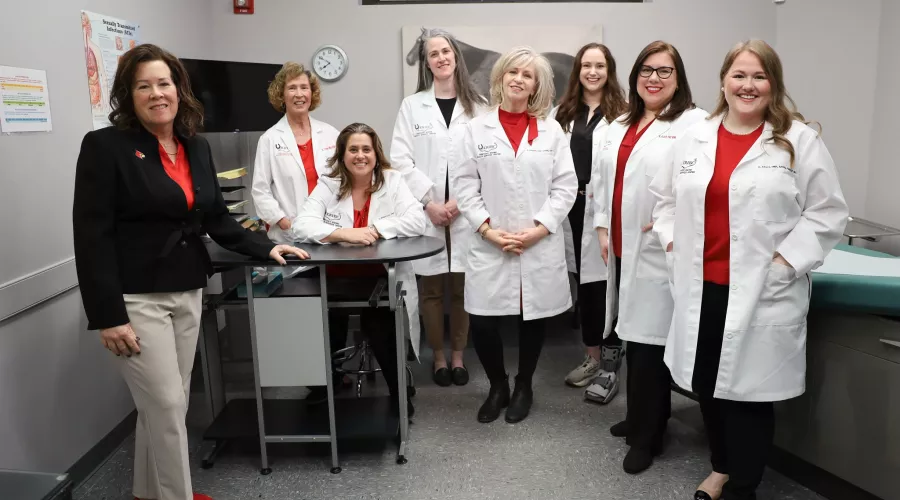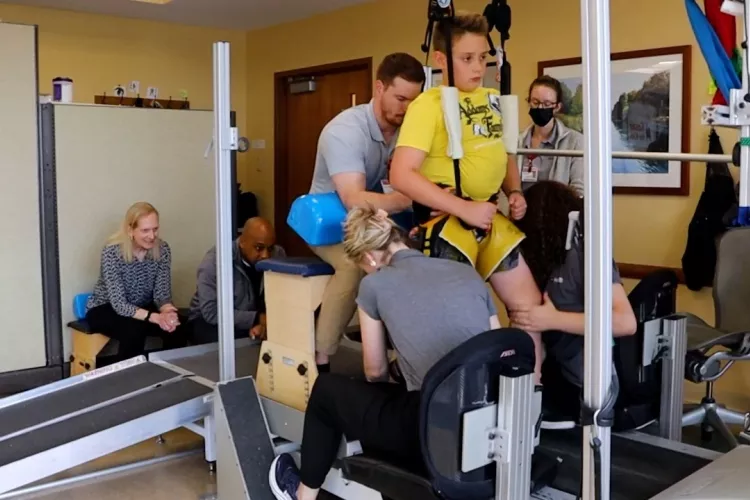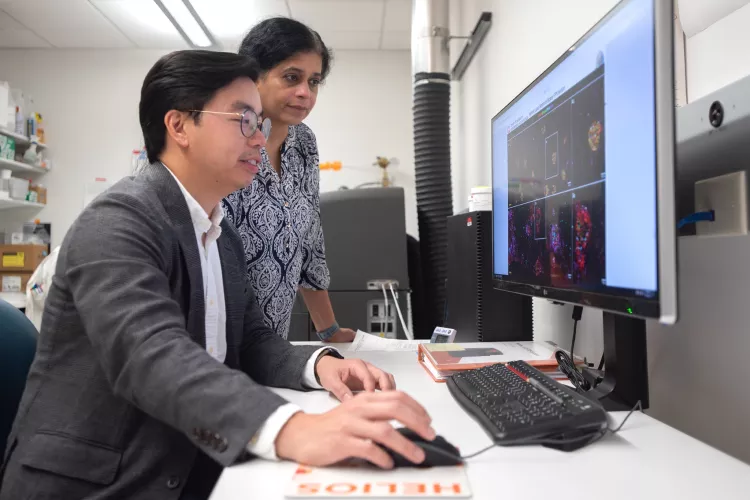UofL nursing marks 20 years of care for track workers
April 1, 2025
UofL School of Nursing faculty celebrate 20 years of providing health care to track workers.
With the advent of spring, Churchill Downs welcomes thousands of locals and well-heeled visitors to the famous racetrack for another Kentucky Derby, billed as the most exciting two minutes in sports. Behind the scenes, hundreds of horse industry laborers such as hot walkers, grooms, exercise riders and farriers work the track’s “backside” to manage upkeep for the more than 1,400 horses that enter Churchill Downs annually.
This year, the Kentucky Racing Health Services Center (KRHSC) is celebrating 20 years of addressing the health care needs of this often-underserved population. A partnership between the UofL School of Nursing and the Kentucky Racing Health and Welfare Fund (KRHWF), the health services center provides care to backside workers and their families for a $10 co-pay. Access to primary health care remains a challenge for backside workers due to financial constraints, language barriers and demanding work schedules.
In May 2018, O, The Oprah Magazine featured the Kentucky Racing Health Services Center in its "Health Heroes" section, highlighting the clinic's significant impact on the health and well-being of racetrack workers. This impact is the result of the continuity of care supported through careful mentoring and succession planning of center leadership, beginning with founding director and dean of the School of Nursing, Whitney Nash, and continuing to the center's next director, Sara Robertson and now Dedra Hayden. This has proved to be an exemplar model of the school's efforts to promote outstanding faculty and foster the professional development of nursing leadership.
Open three days a week, KRHSC has six APRNs (Advanced Practice Registered Nurses) and certified specialists in adult geriatrics, women’s health and midwifery, family practice, and psychiatric mental health. Throughout the past two decades, the staff has engaged in more than 26,000 patient encounters, making a significant impact on the community.
UofL News spoke with Hayden about this major milestone.
UofL News: What was the vision for creating the KRHSC and how has it evolved?
Hayden: The original vision was to serve as a safety net for uninsured backside workers, primarily addressing minor illnesses and injuries. Over the past 20 years, the center has expanded its scope, integrating preventive care, specialty women’s health providers, mental health support, and chronic disease management into our services. We have expanded our interprofessional collaboration within UofL including Latin American and Latino Studies, the School of Dentistry and the Office of Community Engagement. Several pre-nursing, dental, and medical students have completed language internships with us.
UofL News: What kinds of health concerns can the KRHSC help address for backside workers?
Hayden: A typical patient at KRHSC is Hispanic, non-English speaking, and works in the Kentucky horse racing industry, often without health insurance. They come from countries where health care is not a priority because the priority is to survive. Therefore, we start from the beginning and ensure they are up to date on all preventive care services. Common health concerns include musculoskeletal injuries, respiratory conditions, diabetes, hypertension, and mental health challenges such as anxiety and depression.
UofL News: As director and a nurse practitioner for the center-- what is the best part, what is the toughest part?
Hayden: The opportunity to provide accessible health care and advocate for patients who might otherwise struggle to receive care has been incredibly fulfilling. The best part of the job is patient success when you develop trust and goals of care are met. The toughest part is observing patients who experience unfairness outside of our clinic. We are quick to step in as an advocate.
UofL News: What does the clinic mean for the community?
Hayden: It’s an essential resource for the community because we are improving health outcomes and fostering a sense of security for backside workers. It takes a long time to gain trust in our community. Its presence reinforces the importance of equitable health care access for all, regardless of socioeconomic status.
UofL News: Are there particular patients who stay with you – who you remember because of their story?
Hayden: I have so many stories. I was treating a patient who came to the U.S. and was experiencing depression. I learned she had left her children in her home country to come to the U.S. to work and was sending all her earnings back home to them. That was a tough one.
Another impactful story was when a cancer patient was refused lifesaving radiation treatments. I brought the patient in and cleared him for therapy and was quick to call the radiation center and advocate that this patient be seen as soon as possible.
UofL News: Any other thoughts you’d like to share?
Hayden: It is an honor to be the director at the center. Without the unwavering support from the School of Nursing administration, the university and the Kentucky Racing Health and Welfare Fund, we could never accomplish our mission. Even more importantly, the entire team of accomplished APRNs that I have the privilege to work with, who provide evidence-based care to every single patient, make our mission possible. Hats off to Krista Roach, Karen Turner, Sarah Carter, Sarah Cohron, and Courtney Albers. Thank you for helping make it all possible!



